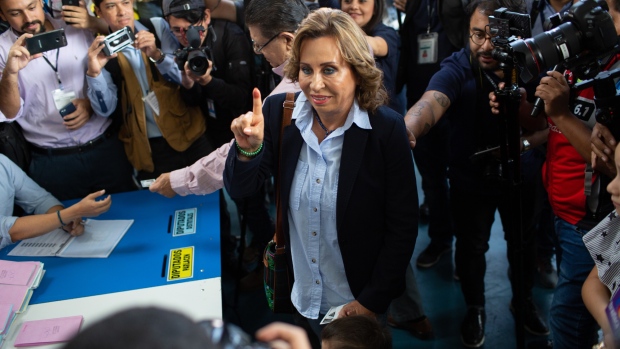Jun 17, 2019
Deficit Doves on Track to Win Election in Low-Debt Guatemala
, Bloomberg News

(Bloomberg) -- A former first lady and an ex-director of prisons are on course to win the first round of Guatemala’s presidential election, both pledging to take on more debt to tackle poverty that has driven migrants to flee to the U.S.
With 97% of polling stations reporting, Sandra Torres, the ex-wife of former President Alvaro Colom, was first with 25.7% of the vote. She’s said the country can run a bigger deficit to fund infrastructure investments that boost growth and create jobs, and has also pledged to deploy the army to tackle gangs.
Alejandro Giammattei, who oversaw the nation’s riot-prone jail system from 2002-2007, was second with 13.9% of votes. He also made the case for wider deficits to boost growth, and is also pledging measures to cut crime, including harsher penalties for illegal gun ownership.
Edmond Mulet, a former ambassador to the U.S. was in third place with 11.4% of votes.
The results are “preliminary and non-definitive”, and candidates have until June 21 to challenge them, the head of the electoral authority, Julio Solorzano, told reporters in Guatemala City.
The winners of the Sunday election will face each other in a runoff vote on Aug. 11, and the president-elect will take office in January.
Guatemala has a tradition of conservative fiscal policy, and one of the world’s lowest debt levels at 24% of gross domestic product. Central bank vice-president Jose Alfredo Blanco last year described the country as the “Germany of Central America” due to its aversion to borrowing.
Both Torres and Giammattei say the country can afford to loosen the purse strings a little.
“If the government doesn’t execute the budget, the economy slows,” Torres told reporters in Guatemala City, before casting her vote. “Of course there is space” to run bigger deficits.
Giammattei told reporters the deficit should widen to 2.5% of GDP in order to boost development, from 1.8% last year. He said he would target economic growth of 6%, in order to reduce poverty.
Guatemala’s economy expanded 3.1% in 2018 and growth this year will be between 3% and 3.8%, according to the central bank.
Extreme poverty, aggravated by low coffee prices and a drought that have hit farmers, has driven many to flee northward. That has soured relations with the U.S., and led President Donald Trump to say he would cut off aid to the country, as well as to El Salvador and Honduras, over their failure to curb migration.
“The two biggest voter concerns that will shape the runoff are the economy and security, which should work to Giammattei’s advantage given his focus on law and order,” said Eurasia Group analyst Risa Grais-Targow.
(Updates vote count in second paragraph.)
To contact the reporter on this story: Michael McDonald in San Jose, Costa Rica at mmcdonald87@bloomberg.net
To contact the editor responsible for this story: Matthew Bristow at mbristow5@bloomberg.net
©2019 Bloomberg L.P.


